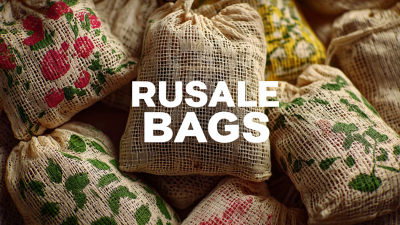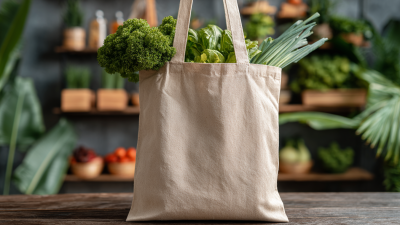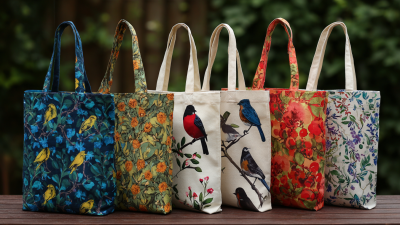In recent years, the call for sustainable living choices has become increasingly vital, with environmental concerns prompting consumers to re-evaluate their daily habits. A notable shift is seen in the adoption of Eco Friendly Reusable Bags, which not only reduce plastic waste but also promote a healthier planet. According to a report by the Ellen MacArthur Foundation, a staggering 1 trillion plastic bags are used worldwide annually, contributing significantly to ocean pollution and threatening marine life. Transitioning to reusable bags can cut down this staggering number, as studies suggest that using just one reusable bag can replace over 700 single-use plastic bags over its lifetime. As consumers become more aware of their ecological footprint, implementing practical solutions such as Eco Friendly Reusable Bags is essential for fostering a more sustainable lifestyle. This blog will explore a checklist of effective strategies and options that empower individuals to make environmentally conscious choices in their everyday lives.

The importance of eco-friendly reusable bags cannot be overstated, especially in our ongoing battle against plastic waste. According to a report by the United Nations Environment Programme, approximately 300 million tons of plastic waste are generated globally each year, with a significant portion coming from single-use plastic bags. These bags not only contribute to pollution but also take hundreds of years to decompose, leading to detrimental effects on wildlife and ecosystems.
By switching to reusable bags, consumers can dramatically reduce their plastic footprint. The Surfrider Foundation estimates that using reusable bags can replace up to 600 single-use plastic bags per person annually. This simple change in behavior not only cuts down on waste but also promotes a cultural shift towards sustainable practices. Furthermore, research indicates that the production of reusable bags often consumes fewer resources and results in lower greenhouse gas emissions over their lifespan compared to traditional plastic bags, reinforcing their role as a responsible choice for conscientious consumers.
Plastic pollution has reached alarming levels, posing significant threats to our environment and ecosystems. According to the United Nations, approximately 300 million tons of plastic are produced each year, with an estimated 13 million tons entering the oceans annually. This not only suffocates marine life but also disrupts food chains, leading to unforeseen consequences for biodiversity. The harsh reality is that if we do not change our consumption habits, the weight of plastic in the oceans could surpass that of all the fish by 2050.
Transitioning to eco-friendly alternatives, such as reusable bags, plays a crucial role in combating this growing crisis. Studies suggest that a single reusable bag can replace hundreds of disposable plastic bags over its lifetime, significantly reducing the demand for single-use plastics. By incorporating reusable bags into our daily lives, we contribute to diminishing plastic waste, preserve natural habitats, and promote sustainability. The adoption of such simple yet effective solutions is essential for fostering a cleaner environment and ensuring a healthier planet for future generations.
In recent years, the demand for eco-friendly reusable bags has surged as consumers become more conscious of environmental impact. Innovative materials are at the forefront of sustainable bag production, providing solutions that both reduce plastic waste and promote sustainable living. According to a 2021 report by Grand View Research, the global reusable bag market size was valued at approximately $4.5 billion and is expected to grow significantly as more individuals and businesses seek sustainable alternatives to single-use plastics.
Among the cutting-edge materials being utilized are recycled plastics, organic cotton, and even biodegradable polymers. Recycled PET (rPET), for instance, repurposes plastic bottles into durable bags, significantly decreasing the reliance on virgin plastic. The use of organic cotton not only minimizes pesticide usage but also supports sustainable farming practices, appealing to eco-conscious consumers. Furthermore, the introduction of biodegradable materials—like those made from corn starch—promises to combat landfill waste, as these bags can decompose naturally within months, unlike conventional plastic bags that take centuries to break down. Such innovations not only cater to the growing consumer desire for sustainability but also align with global initiatives to reduce plastic pollution, creating a more sustainable future.
The growing trend towards reusable bags reflects a significant shift in consumer behavior, driven by an increasing awareness of environmental issues. As people become more conscious of their ecological footprint, they are opting for sustainable alternatives over single-use plastic bags. This change is not just a passing fad; it represents a lasting commitment to reducing plastic waste and promoting a healthier planet. Retailers are responding to this shift by offering incentives for customers who bring their own bags, reinforcing the idea that every small action contributes to larger environmental goals.
The economic implications of this transition are profound. Businesses are beginning to recognize the cost benefits associated with reusable bags, including decreased spending on plastic bag production and disposal. Furthermore, consumers are drawn to brands that champion sustainability, often leading to increased loyalty and sales. As more consumers favor eco-friendly products, companies that adapt to this change can enhance their market position while supporting a more sustainable economy. Thus, the shift towards reusable bags is not only a reflection of conscious consumerism but also a catalyst for economic change in the retail sector.
Governments around the world are increasingly implementing policies and initiatives to promote the use of eco-friendly reusable bags as part of their commitment to sustainability. Many countries have introduced legislation to ban single-use plastic bags, encouraging consumers to transition to reusable alternatives. These policies not only help to reduce plastic waste but also raise awareness about the detrimental impact of plastic pollution on our environment. By mandating a shift in consumer behavior, governments are taking a stand in the fight against pollution and encouraging more sustainable lifestyles.
In addition to bans, many local governments offer incentives for businesses to provide reusable bag options and educate their communities about the benefits of sustainable choices. Campaigns focused on reducing plastic usage often feature workshops and informational sessions that empower individuals to make conscientious decisions when shopping. This grassroots approach complements national legislation and fosters a culture of sustainability within communities. Ultimately, by prioritizing the promotion of reusable bags, governments are taking significant strides toward creating a greener, more sustainable future for all.
| Country/Region | Policy/Initiative | Bag Type Supported | Impact Goal | Year Implemented |
|---|---|---|---|---|
| California, USA | Plastic Bag Ban | Reusable Bags | Reduce Plastic Waste | 2016 |
| United Kingdom | 5p Bag Charge | Recyclable & Reusable Bags | Encourage Reuse | 2015 |
| Canada | National Plastic Waste Strategy | Biodegradable Bags | Eliminate Single-Use Plastic | 2020 |
| Australia | State-Led Bag Bans | Woven Bags | Reduce Littering | 2019 |
| European Union | Single-Use Plastics Directive | Reusable & Recyclable Bags | Long-term Waste Reduction | 2021 |





